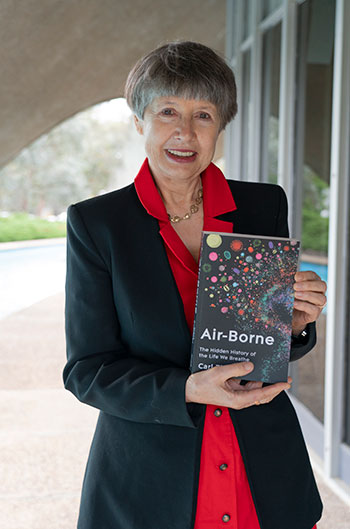
Spark your curiosity, make a fresh discovery or immerse yourself in a new world this summer with reading, listening and viewing recommendations from some of Australia's top scientists.
As part of a tradition now in its 10th year, Fellows of the Australian Academy of Science reveal what media have kept them captivated ahead of the summer holidays.
The list includes a wide range of fiction, non-fiction, children's books, podcasts, and television.
Some readers escape into satirical fantasy, while others tackle hard-hitting dystopian novels. Non-fiction selections span historical deep-dives to hilarious memoirs ("LOLed throughout," Professor Jennifer Martin says of I'd Rather Not).
Several Fellows chose to school up on hot topics like artificial intelligence, while others opted for titles that explore the role of science in an increasingly contested world.
"Every year, I look forward to seeing what other Academy Fellows are reading," says Professor Chennupati Jagadish AC, Academy President, who recommended AI Superpowers: China, Silicon Valley and the new world order. "I always find some fascinating books to read over the holidays."
Academy Fellow and winner of the 2025 Prime Minister's Prize for Science, Professor Lidia Morawska, owns multiple copies of the "fascinating and important" Air-Borne: The hidden history of the life we breathe by Carl Zimmer.
The book weaves together the spellbinding history of aerobiology with current reporting on airborne threats to public health - including Professor Morawska's own world-leading research and advocacy for recognition that COVID-19 could be spread through the air.
Check out a taster of the picks below or browse the full list.
Find all previous Fellows' reading lists
Selected recommendations
I Am a Strange Loop
Douglas Hofstadter
Recommended by Professor Kylie Catchpole FAA FTSE
I Am a Strange Loop is a glorious examination of self-reference. Language being what it is (with the necessity of subject and object in sentences), I can't tell you how thinking of myself as a feedback loop has changed me. Just read it - you will never think of yourself in the same way again.
Prove It: A scientific guide for the post-truth era
Elizabeth Finkel
Recommended by Emeritus Professor Robin Batterham AO FAA FTSE
This is a must read for anyone that thinks evidence-based reasoning beats opinions. Elizabeth Finkel has chosen five major topics, each controversial and with captivating writing and well researched data leads the reader through to a sound position. For those like me who believe that truth is always shifting, this book is compulsory reading.
Oliphant: The Australian genius who developed radar and showed Oppenheimer how to build the bomb
Roland Perry
Recommended by Professor Fiona Stanley AC FAA FAHMS(Hon) FASSA
This is a great Australian story - stimulated because Oliphant was excluded from the film about the atomic bomb, Oppenheimer. Oliphant was one of our most brilliant scientists and went to Rutherford's lab in Cambridge as a young physicist from South Australia. During the war he discovered and developed radar, and keen to ensure that the Allies got the bomb before Hitler, his research was the basis for the bomb. He shared this with both Oppenheimer and the Russians to get there first and after Hiroshima and Nagasaki, he lobbied with Oppenheimer to stop it being used again. Oliphant was the first President of the Australian Academy of Science.
50 Ways to Die in Space
Eileen O'Hely, illustrated by Nico O'Sullivan
Recommended by Professor Tamara Davis AM FAA
Hilarious and captivating take on all the ways to die in space. It's a graphic novel following the story of a grumpy grandfather warning his grandchild of all the gruesome ways to die in space. The author has a PhD in astrophysics, and has done a brilliant job of getting real science across in an entertaining and joyful manner.
Juice
Tim Winton
Recommended by Professor Emeritus Michael Hynes FAA
I read this dystopian novel by the famed Western Australian almost one year ago. Unlike many of the books I have read in the ensuing months its impact remains. In particular, images of summers spent completely underground and vigilante organisations waging war against clans of fossil fuel providers in their fortresses. The issues arising in 2025 from the policies of world governments regarding climate change indicate that this is the future for my grandchildren.






